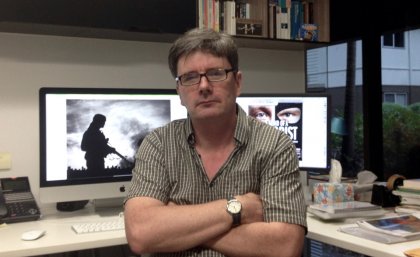
Most terrorists are not psychopaths or sadists, nor are they people who would necessarily be inclined to shoot a gun or plant a bomb.
That is one of the key statements of Fueling Terror, an article co-authored by University of Queensland School of Psychology’s Professor Alex Haslam and University of St Andrews’ (Scotland) Professor Stephen Reicher.
The research is published in a Scientific American Mind investigation called The Mind of a Terrorist, under the title Fueling Terror.
The article questions the effectiveness of current counter-terrorism efforts and explains how overreaction from non-Muslims makes disruptive leaders more influential.
Specific mention is made of US presidential hopeful Donald Trump.
“One of the core findings in our recent research is that people are more likely to support a bellicose leader if their group faces competition from another group behaving belligerently,” Professor Haslam said.
“Trump might have been wise to ponder this before he suggested that all Muslim immigrants are potential enemies who should be barred from entering the US.
“Far from weakening the radicals, such statements provide the grit that gives their cause greater traction.
“Indeed, after Trump made his declaration, an al Qaeda affiliate re-aired it as part of its propaganda offensive.”
Fueling Terror observes that the success of immoderate politicians is tied to the success of ISIS and vice versa.
The article discusses studies that explored the feeling of ‘homecoming’ for Muslim Scots returning from travels to Scottish airports.
Respondents reported that the experience of being treated with suspicion provoked anger and cynicism towards authority figures when they considered Scotland to be their home.
It led the Muslim Scots to distance themselves from outwardly British-looking people and to regard authorities as enemies rather than friends.
“Social psychology suggests terrorists are mostly ordinary people, driven by group dynamics to do harm for a cause they believe to be noble and just,” Professor Reicher said.
“Dramatic conversion (comes) after a series of psychological steps that are occurring regularly in our communities today: aspiration to belong, misrecognition, disengagement and disidentification.
“Radical minority leaders use violence and hate to provoke authorities to institute a culture of surveillance against minority group members.
“This culture stokes misrecognition, which drives up disidentification and disengagement from the mainstream.
“This distancing can make the arguments of radicals harder to dismiss.”
Media: Professor Alex Haslam, a.haslam@uq.edu.au , +61 7 3346 7345. Robert Burgin, UQ Communications, r.burgin@uq.edu.au, +61 7 3346 3035, +61 448 410 364.
.jpg)










